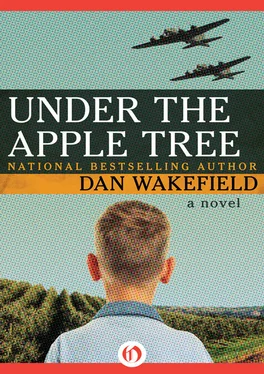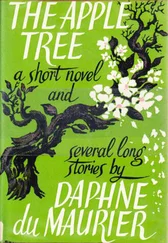It was listening to “Jack Armstrong, the All-American Boy” that finally snapped him out of it. First it just made him feel worse, listening to Jack and his pals risking their lives just like Roy out in the South Pacific outwitting the Japs while he just lay in his bed like a wet noodle. Then it got him mad at himself, realizing he was wasting his own red-blooded All-American boyhood hiding under the covers and slacking off all day after jacking off the night before, and he decided right then and there that he was going to get himself fired up again and rejoin the fight for freedom.
Artie got dressed and went downstairs to get something to eat. Dad was still at work of course, and Mom hadn’t come home yet from her day of wrapping bandages for the Red Cross with the Moose Ladies Auxiliary, but she’d left him a note saying there was a peanut butter and jelly sandwich for him in the icebox to have for lunch. It was way too late for lunch now, and anyway peanut butter and jelly struck him as too kidlike for his manly new mood of dedication. Instead, he made a big bowl of Wheaties, Breakfast of Champions, and ate it while he read the paper.
When he saw the ad for the new movie playing at the Strand he felt the thrill of knowing he was back on the right track, that God was looking down to help him regain his patriotism. The movie starting that very night was Destination Tokyo , a terrific War story about these guys on an American submarine who slip right through the entire Japanese Navy to strike at the Imperial stronghold. It came to Artie in a flash that he’d kill two birds with one stone in his exciting new effort to get back into action by going to watch the inspiring movie and then walking Shirley Colby home. He’d been neglecting her lately, but he’d make up for it by buying her a rainbow Coke at Damon’s Drugs.
Artie crept up to the Strand ticket booth with his head bent low, and then popped up so he was staring right into Shirley’s face. He raised his upper lip and stuck his teeth out so he looked like a Jap.
“ Destination Tokyo , prease,” he said in his best Oriental slur.
“Oh! Artie. You scared me.”
“So solly, prease.”
He slid his quarter under the little arc of an opening in the glass, and Shirley slipped his ticket through.
“How you doing?” she asked.
“Well, I been kind of under the weather, which is why I haven’t been around for a while, but now I’m I-A. In fact, how about I buy you a Coke when the show’s over?”
“Oh, no, I can’t,” she said quickly.
“How come?”
Shirley’s eyes flicked away, and her cheeks got brighter.
“I have to go right home.”
“Well, I can walk with you.”
“Not tonight,” she said. “Maybe some other time.”
She looked past him, over his shoulder, and Artie realized there were other people standing in line behind him.
“I can walk you real fast,” he said.
“ Please , Artie. Not now.”
A guy behind him started whistling real loud.
“Okay,” Artie said.
He took his ticket and headed for the door, feeling like he’d just got the brush-off. In the lobby, he looked around for Burt Spink, the fat, jolly Usher, who always had some kind of joke about the weather, like “Colder than a brass monkey’s balls in December,” or “Hotter than a witch’s tit in Brazil.” He figured old Burt would get his mood up again.
Burt wasn’t there, though. Instead, there was some guy he’d never seen before standing at Attention by the ticket box, all decked out in a red jacket with gleaming gold buttons, a white shirt and little black leather bow tie and black pants with a red stripe down the side. All he needed was a little round black cap with a strap underneath the chin and he’d have looked like “Johnny,” the midget mascot for Philip Morris cigarettes. Except this guy was tall and skinny, and he had a blond, flattop haircut and blotchy skin. Still, the outfit looked so much like the Philip Morris trademark Artie wouldn’t have been surprised if the guy made the high-pitched “Johnny” yell: “Come in and call for Phil-ip Morr-ees!” Burt Spink always wore an old green soda jerk jacket and a wrinkled striped shirt.
The new Usher jerked his head toward Artie with military precision, like he was executing an “eyes left.”
“Ticket, please,” he snapped.
“Where’s Burt Spink?” Artie asked as he handed over his ticket.
“If you mean my predecessor, I understand he has enlisted in the Armed Forces,” the new guy said, tearing Artie’s ticket exactly in half with a single rip , and handing him the stub.
“Oh, yeah. I forgot he was joining up when he turned eighteen.”
“Follow me, please,” the new Usher said sharply, and turned with a click of his heels to the door of the theater. The Movietone News was on, showing some Flying Fortress coming in on a wing and a prayer from a mission over Germany and Artie stopped a moment, staring at the screen, then heard a click and a solid beam of light shot forth from the heavy black flashlight the Usher carried and struck the tops of Artie’s shoes.
“This way, please,” the Usher instructed and Artie obeyed, even though the new guy was taking him farther down than he liked to go, right to the second row before the screen, where you had to crane your neck up to see the picture and the actors loomed over you like giants. The beam of the Usher’s flash seemed to be pulling Artie forward like a magnet, and when it swung sharply to the left he sidled past a couple on the aisle and sat down in the empty third seat, even though he usually made a point of being on the right side of the theater. He was going to complain to the Usher that he had put him in the wrong place, but the beam snapped off and the Usher had turned and melted into the dark. Artie could excuse himself and go look for a place he liked better, but he felt stuck, like the darned Usher had nailed him into that seat and there was no use trying to shift.
He hated the Usher’s guts.
Who did he think he was, anyway?
In fact— who was he?
Artie was sure he’d never seen the guy before, which meant he wasn’t from Birney or Oakley Central or anywhere around there.
It was strange. Artie had a hard time concentrating on Cary Grant steering his submarine through the Japanese Imperial Navy, wondering who in the world the new Usher was and what he was doing there.
“Who is he, anyway?” Artie asked Shirley.
He had waited for her at the far corner of her block the next night after supper, not wanting to have to face Mrs. Colby but determined to have a word with Shirley on her way to work.
She was walking real fast, but as they rounded the corner away from her house she stopped and fished a pack of Luckies from her purse.
“Clarence Foltz?” she asked, as she pulled out a cigarette and looked up and down the block. It was bad enough for a girl to smoke, but a girl smoking “in the street” was even worse. It looked like the coast was clear, though.
“ That’s his name?” Artie asked.
“Why? What’s funny about it?”
Shirley got the cigarette lit and took a big drag, blowing the smoke out of her nose.
“How do you spell it?”
“F-o-l-t-z, I guess,” she said, and started walking again.
“Never heard of it. Who is he?”
“The new Usher , for Heaven’s sake.”
“I know that. I mean, where does he live?”
“Miss Winger’s Boardinghouse, I think.”
“I mean where’s he from? Like where do his folks live?”
“Michigan. Some little town.”
“So what’s he doing here in Birney?”
“Working. At the Strand.”
“I know. But how come?”
“Men have to work. He’s a man.”
Читать дальше












